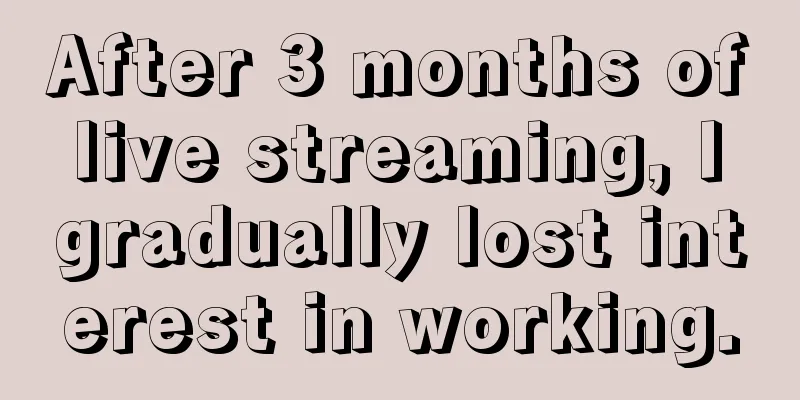After 3 months of live streaming, I gradually lost interest in working.

Last time I shared with you Brother Dao’s experience of live streaming sales. It has been almost 3 months now. Without further ado, let’s take a look at the results: The total amount is more than 30,000, which averages out to more than 10,000 a month. I do it all after get off work, about 3-4 hours a day, with occasional breaks. Although this amount is not too much, I am still satisfied with it overall. However, the data has fluctuated recently, and the broadcast is not that much every day. In general, I have gained a lot from doing live broadcasts in the past three months, and I have a lot of insights. It is true that these three months have been too busy. Every day, besides going to work, I do live broadcasts. I used to play mahjong with friends and colleagues every weekend, but since I started live streaming, I have given up playing mahjong. Today is the weekend, I have a little more time, so I would like to share a few thoughts: 1. The logic of live streaming sales 2. Live streaming is hard and tiring, but also interesting 3. Nothing is absolutely stable. 4. Excessive methodologies, learning by doing 5. At any time, the body is the capital of revolution 6. Circles are important. A group of people can help you go further. 1. The logic of live streaming salesThe essence of live streaming is sales. It is about targeting a certain target user, selecting a product, solving their problems, or bringing them value, and getting commissions. This is a transaction. The scale of transactions can be increased through live streaming technology, images, and words. The Internet is a lever for selling goods. When we sell goods offline, we are limited by physical space and cannot sell to thousands of people at the same time, but we can do it online. But online sales also have their own characteristics. For example, users can only watch through the host’s description and cannot try out and experience the product like offline entities. Therefore, for live streaming, the wording is very important, and the scene of the live broadcast room is very important. At the same time, in order to obtain more traffic for online live streaming, in addition to taking care of users, you also have to "please" the platform, because the platform allocates traffic to you, and you must be able to handle it. What does it mean to handle it? It means that you convert traffic into transactions. Only if you can handle the traffic will it allocate more traffic to you. The platform allocates traffic based on a model, which includes shallow data and transaction data. Shallow data refers to whether users can stay effectively after visiting your live broadcast room, and whether they can interact with you by commenting, liking, etc. Transaction data refers to how much GMV you can convert if you push 1,000 users to you. After mastering the platform's push model, you have to design targeted words and scenarios. 2. Live streaming is hard and tiring, but also interestingIs live streaming difficult? To be honest, it's quite difficult, but also quite interesting. For 3 months, I would never believe that I could do live streaming and sell goods. I thought I was a natural i-person with no sense of camera performance and I didn’t dare to act in front of the camera. But the facts prove that many things are just limits we set for ourselves in our minds in advance. Many things can actually be done as long as you have the courage and are not afraid of embarrassment. To be honest, when I was broadcasting just now, I was incoherent and talked a lot, using all kinds of modal particles, and my voice was unstable. I could only read according to the script. But I just persisted, broadcasting for 4 hours every day without fail, for half a month in a row, and then I started to get the hang of it and truly understood what the speech framework and speech logic are. Not only do you see the verbatim transcripts of other people's words, you also see the design details in them, such as hooks, sense of welfare, sense of scarcity, empathy, etc. But it is indeed very tiring, because it is a part-time live broadcast. I am already very tired after get off work every day, but I still have to do the live broadcast. I feel that live streaming is very exhausting. I use the "holding order" live streaming method, which is even more tiring. In the first few days, my throat couldn't take it and my voice changed. Later, after I got familiar with it, it felt a little easier. But even though I am much more familiar with it now, I still feel very tired after broadcasting for 4 hours after get off work. I will review the day's data after the broadcast. I often go to bed at 12 or 1 in the morning. I am very sleepy at work the next day, so I sleep in the taxi. After get off work, I am too tired to affect my condition, so I will also sleep in the car for a while. During the Spring Festival, I didn’t have work and could broadcast two shows every day. However, I had a better rest, so my condition was pretty good and the data was also good. So, I think live streaming is really tiring. If you also want to do live streaming, you should first seriously ask yourself whether you can handle it. The so-called being able to endure is not only about the physical aspect, but also the mental aspect. When you are very tired of broadcasting, if the data is very good, that's fine, it can motivate you to continue broadcasting. But if your data is still very bad, with an average of only a few people online, two to three hundred people watching for four hours, and a GMV of one to two hundred yuan, if you can't bear it, your mentality may collapse. However, the platform attaches great importance to the length of live broadcast, especially for new accounts. You must maintain a certain amount of online time to have a chance. Of course, it is not just about increasing the online time. You also need to understand operations. The scope of operations is very broad, including various strategies, such as traffic strategy, speech strategy, scene strategy, product selection strategy, broadcast time strategy... You have to resist physical fatigue and use your brain to imitate and learn other people's strategies. You have to do whatever the strategy requires. In the first month of broadcasting, whenever I had time, no matter where I was, I would open the live broadcast square to check out other people’s data, their rhetoric, and their quality. As soon as you open Douyin, you will see the live broadcast rooms related to live streaming, and then add them on WeChat. If you have specific questions, you will also get some paid consultation. As long as there are colleagues doing live streaming around me, I will be particularly interested and always want to communicate with each other about what products they are doing, what the data is like, and what kind of operating strategies are used. Many times, after I finish broadcasting at night, I am still thinking about what went wrong with today’s words and how I can modify them tomorrow. When the data is good, I will sometimes be so excited that I can’t sleep even after the broadcast. I used to hear people say that people who do live streaming are prone to sudden death. Now I can understand it. When there are a lot of people online in your live streaming room, every time you get on the bus and place an order, you will not want to end the live broadcast. You will forget your tiredness and become more and more excited. This is also the interesting part of live streaming, and it is also the part where entrepreneurship is both painful and joyful. Although there are many things to do and it is very tiring, you can make quick adjustments through your own strategies and get results through the market or transactions. Compared with the workplace, you have greater autonomy and a greater sense of control, which is one of the important elements of happiness. I have two identities, one is a worker, and the other is a live broadcaster who sells goods, but at the moment, the latter makes me feel more interesting. I am even gradually losing interest in making products... 3. Nothing is absolutely stableMany times, I have been thinking, if I can achieve this sales figure on average every month, can I consider quitting my job and going all in on live streaming? But now I feel that this way of thinking may not be right. I am still thinking with the mindset of a worker, always thinking about "stability". I've been working for so many years, and it's been quite stable. I work 22 days every month and get a fixed salary. Although it's a bit painful sometimes and I have to endure some of the boss's weird ideas, there are also some problems with colleagues that cause friction and consumption. But in many things, there is no so-called stability. You have to accept instability and get used to it - the bigger the wind and waves, the more expensive the fish. Is it stable to work? Is it stable to pass the civil service exam? Is it really like this? I was recently interviewing product managers, and out of 10, 1 was still employed, while the rest were forced to resign. Civil servants have a hard time, there are many, such as salary cuts, and there are many dogmas in the system that not everyone can accept. There is no absolute stability, only relative stability. Don't think about going ashore, there may be no shore at all... IV. Excessive methodologies, learning by doingRecently, I have been sharing data and insights on Xiaohongshu and in some peer groups. Many people have asked, how do we do it? How to choose products? How to create an account? How to prepare the script? How to attract traffic? At the beginning, I told them seriously, but I found that even though I told them all the methods, they still didn’t do them in the end. They were worried about this, afraid of that, didn’t think clearly here, didn’t understand the logic there. One month has passed and still nothing has been done. Later, I found that many people, especially those working in the workplace, have this problem. They will pursue a deterministic methodology and then think about executing it according to this method. But many times, we give up in the process of pursuing methodology because we have never experienced it and have never obtained results, so we are always skeptical about this matter. If you work in a company, the company will cover you if you fail. However, if you work on your own, it is your own loss and you will be responsible for it yourself. That’s why you are afraid and don’t dare to do it. The main reason is that we are too obsessed with methodology. There are too many methodologies in many things now, but what is lacking is execution. There is no absolutely universal methodology, only the method that suits you best. In the process of executing it over and over again, you can optimize the method and then repeat it. Eventually you will develop a method that is relatively suitable for you and can lead to success. Therefore, learn by doing, and know when to stop using methodology. Abandon the mindset of working for a living. 5. At any time, the body is the capital of revolutionIn the first month, I worked during the day and did live broadcasts at night. After a while, I felt a little pain in my waist. My body was sending out warnings. When you are not feeling well, you find it difficult to concentrate on anything you do, and the pain takes up a lot of your energy. Only then do you truly understand that your body is the capital of revolution. So, no matter how tired or busy I am recently, I will always take some time out to exercise every weekend. I will go swimming or exercise in the gym. I usually stretch and do push-ups after the live broadcast in the evening. When you have more energy, you will have the motivation to do things. 6. Circles are important. A group of people can help you go further.The live streaming business is developing so fast now, and many skills and techniques are outdated. The best way is to find like-minded people and share and communicate together. It's not impossible to work behind closed doors and do your best. There is no problem when the trend and data are good. But when the data is not good, everyone can communicate and share. A problem that you think is difficult may be a challenge for others. |
>>: How Coach came back from the dead
Recommend
Where is the official gmarket website entrance? How to log in?
Gmarket is the largest shopping website in South K...
For large companies, your competitive advantage lies in this...
This article mainly talks about how small and medi...
What is the Amazon blue badge? What is its function?
Many buyers on Amazon have discovered the existenc...
Is it difficult to develop an Amazon API interface? Is it easy to develop Amazon products?
As a mainstream cross-border e-commerce platform, ...
Case Analysis | Analysis of Weipaitong’s User Operation System
More and more cultural relics enthusiasts hope to ...
Mixue Ice City, disrupting music festival marketing again
Mixue Ice City announced that it would launch an &...
With more than 100,000 private domain users accumulated in half a year and 20 million private domain GMV created, how does the maternal and infant brand Keyoubi operate its private domain?
As more and more post-90s have become the new gene...
Can new sellers still sell on Amazon? A comprehensive analysis of Amazon’s prospects
Becoming a new seller on Amazon may be the dream o...
How to register a local store in Taiwan on Shopee? How to select products on Shopee Taiwan?
Shopee is an e-commerce platform headquartered in ...
There are one million netizens who watch him begging for food every day
Do you know how homeless people beg for food? Rece...
Temu's third quarter sales have exceeded US$5 billion
According to 36Kr, Temu's sales in the third q...
Spending thousands of yuan to date a "paper man", who is creating dreams for 2D girls?
Why would someone be willing to spend thousands of...
How to set up Shopee live streaming? What is the method?
There are more and more newcomers doing live broad...
How long does it usually take for Amazon Europe to conduct a KYC audit?
Sellers on Amazon Europe sometimes encounter KYC a...
What should users do if they accumulate tens of thousands of points but just don’t spend them?
2022 has just passed, and it is time for points on...









